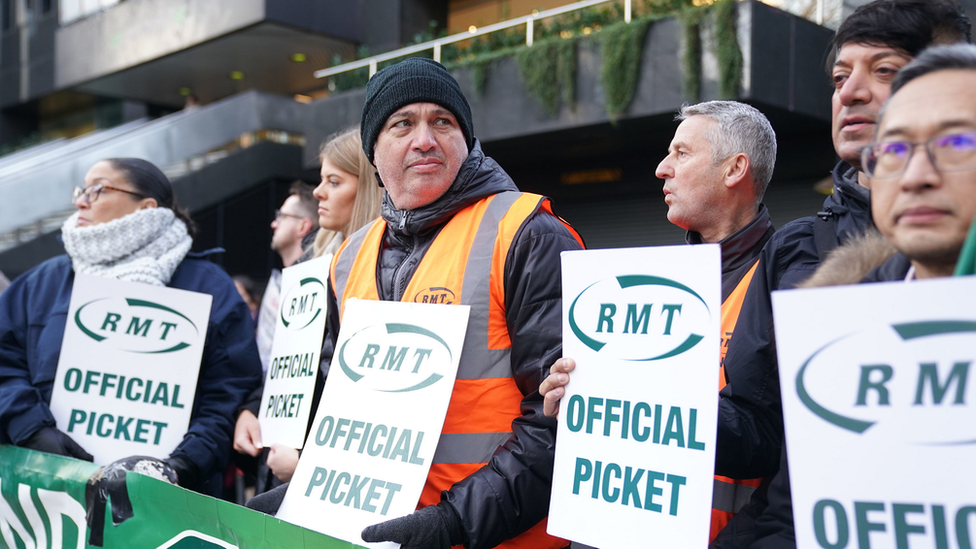Scottish ministers refuse to comply with UK government strike plan
- Published
- comments
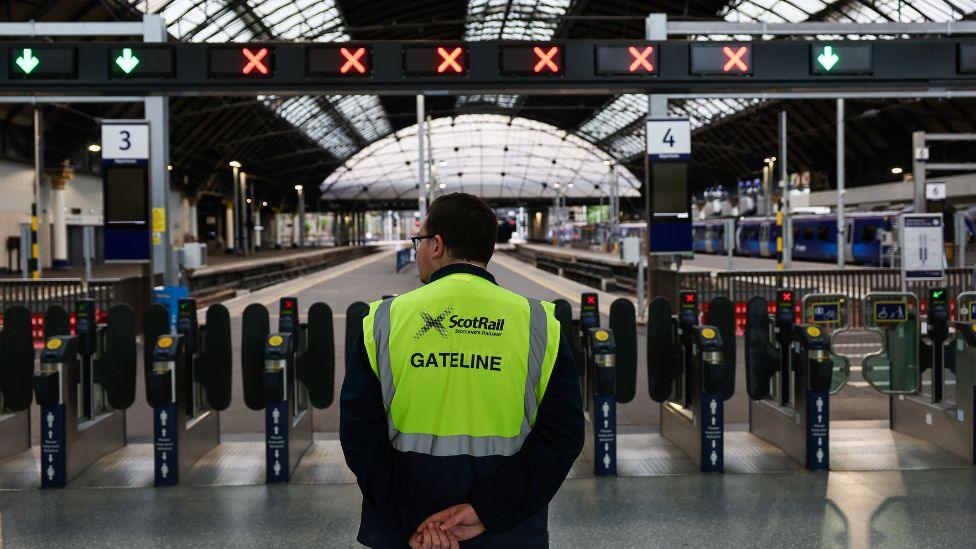
The proposals aims to ensure about 40% of rail services will run during strikes
Scottish ministers say they will refuse to co-operate with UK government legislation designed to ensure minimum levels of service during strikes.
Holyrood cabinet secretary Neil Gray condemned the "appalling" plan ahead of the King's Speech at Westminster.
The legislation aims to ensure about 40% of rail services will run during strikes. This would apply in Scotland.
It would also specify minimum service levels for border security staff in England, Wales and Scotland.
Prime Minister Rishi Sunak said he hoped the proposal, under the Strikes (Minimum Service Levels) Act, would be enacted in time to "stop unions derailing Christmas for millions of people".
The legislation was to be laid in Parliament on Tuesday and will be subject to parliamentary approval.
Mr Gray, cabinet secretary for wellbeing economy, fair work and energy, said: "Ministers strongly oppose any Act that undermines legitimate trade union activity and does not respect fair work principles.
"This is another appalling piece of anti-trade union, anti-worker legislation from Westminster that will harm, not improve industrial relations."
He called for a "progressive approach" to relations with trade unions, with improved protections for workers.
Mr Gray added: "The UK government's introduction of the Minimum Service Levels Act is in direct contradiction to that, ignores the devolution settlement and fails to recognise the authority of the Scottish government in devolved areas".
"So we will continue to do all we can to oppose this legislation and will not co-operate with establishing any minimum service orders here."
He later told BBC Scotland News ministers "will not enforce any minimum service obligations upon employers". Mr Gray also said that the Scottish government would " fight" the legislation "as hard as we possibly can", including in reserved areas.
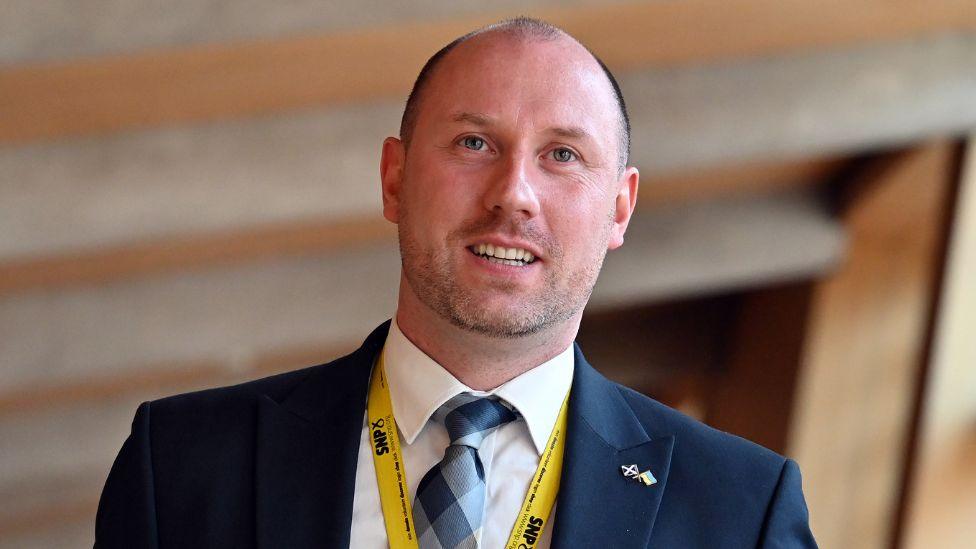
SNP minister Neil Gray says the government would refuse to comply with the new rules
Under the Strikes (Minimum Service Levels) Act, UK ministers can set minimum service levels for rail, health, fire and education services, as well as border security and nuclear decommissioning.
It would give the Scottish government the power to enforce minimum service levels in devolved areas - fire, health and education - but Holyrood ministers have indicated they will not exercise this option.
However, Scottish government ministers would not have a say on how the rules apply to workers in devolved areas - cross-border or UK-wide rail services, border security and nuclear decommissioning.
The rules would allow employers to issue work notices to unions, identifying who is required to work during industrial action.
There would be no automatic protection from unfair dismissal for an employee who is told to work through a notice but chooses to strike.
The UK government said regulations will mean the equivalent of 40% of normal timetables operating as normal. Unspecified "priority routes" would also be kept open, the government said.
Although Scotland has its own nationalised rail network, ScotRail, services north of the border can be affected by UK-wide Network Rail strikes.
The border security rules would apply to both the Border Force and some HM Passport Office workers.
The UK government said border security services "should be provided at a level that means that they are no less effective than if a strike were not taking place", ensuring all ports and airports remain open during industrial action.
The statutory guidance is to be set out by the Department for Business and Trade following a consultation.
Unions who fail to comply could be sued, the UK government said. The maximum damages that courts can award against a union for unlawful strike action is £1m.
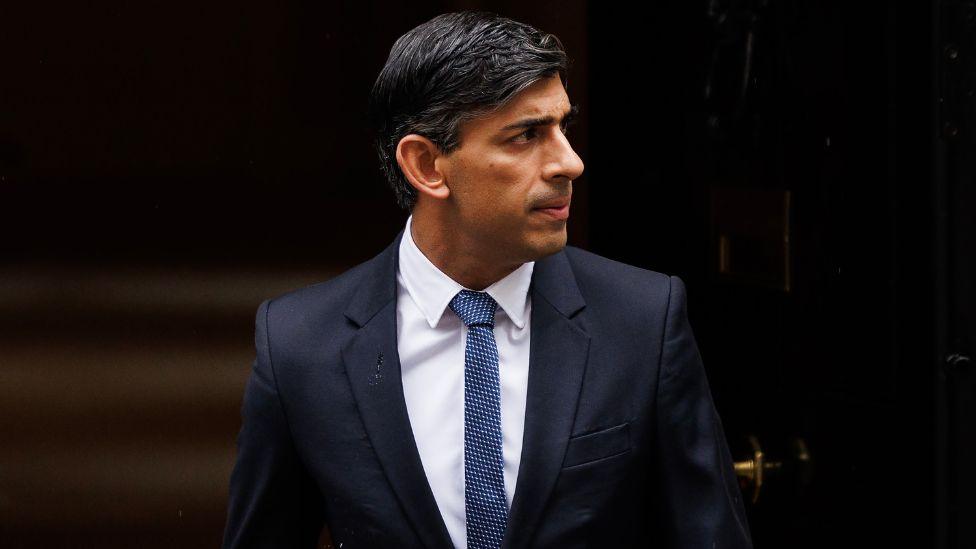
Prime Minister Rishi Sunak hopes to have the new rules in force by Christmas
Mr Sunak said: "We cannot go on relying on short-term fixes - including calling on our armed forces or civil servants - to mitigate the disruption caused by strike action.
"That's why we're taking the right long-term decision to bring in minimum service levels, in line with other countries, to keep people safe and continue delivering the vital public services that hard-working people rely on."
Scotland Secretary Alister Jack said the decision on whether or not to implement minimum service levels during strike action was "entirely up to" the Scottish government.
Asked about the Scottish government stating they would not co-operate with the legislation, the Conservative minister told BBC Scotland News: "That's fine. The minimum services legislation bill has gone through, there's some secondary legislation attached to it.
"There are six sectors it affects but in areas like health and ambulances or fire engines and education, those areas are devolved and we've said to the Scottish government if you don't want to have a minimum service level, that's entirely up to you because it is devolved.
"If they don't want to do that when there's ambulance strikes on and the public feel they're not getting that right level of service, that's on the Scottish government, that's their responsibility."
'Sticking plaster'
Deputy Labour leader Angela Rayner described the announcement as "another sticking plaster to distract from the Conservatives' track record of failure".
She added: "We all want minimum standards of service and staffing but it's Tory ministers who are consistently failing to provide them."
TUC general secretary Paul Nowak said the proposals were "unworkable, undemocratic and almost certainly in breach of international law".
The TSSA transport union said they would only "inflame industrial tensions".
GMB national secretary Rachel Harrison added: "While the government continues to scapegoat staff, it is patients and staff who will continue to pay the price for their neglect."
- Published31 January 2023
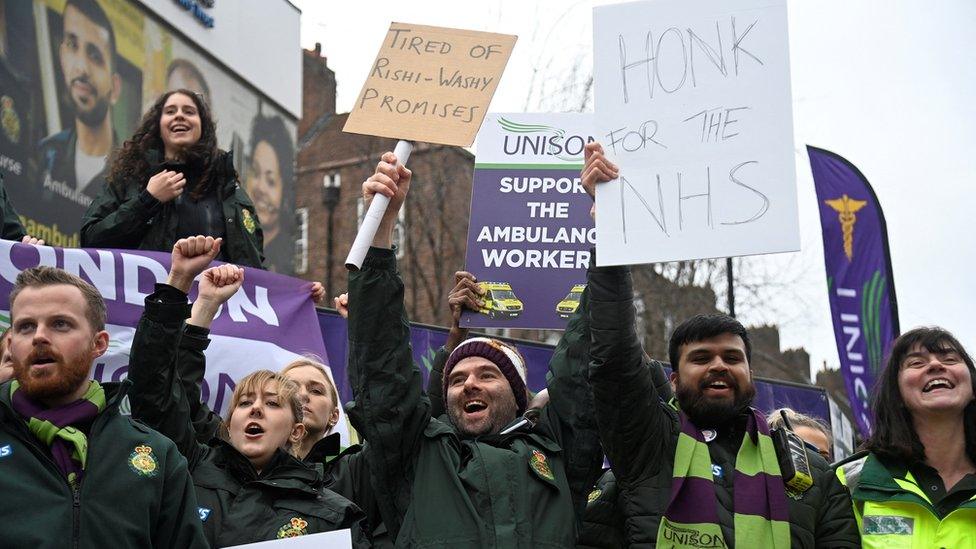
- Published10 January 2023
